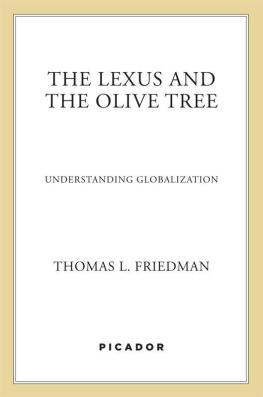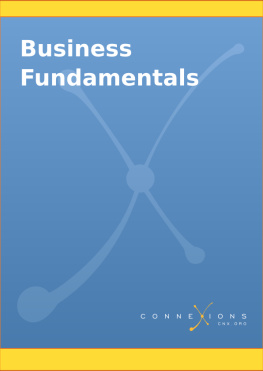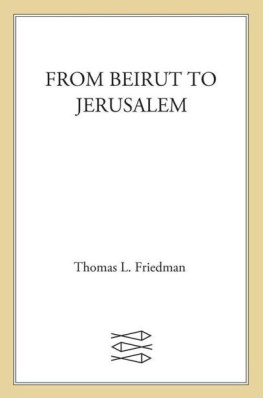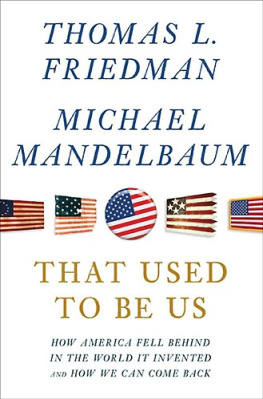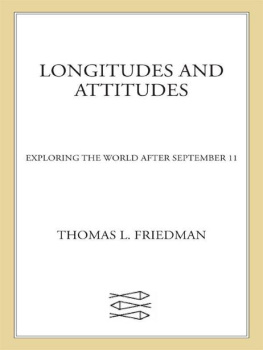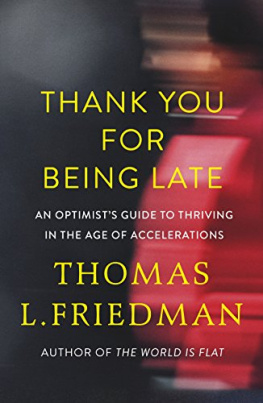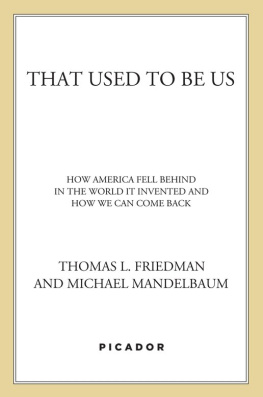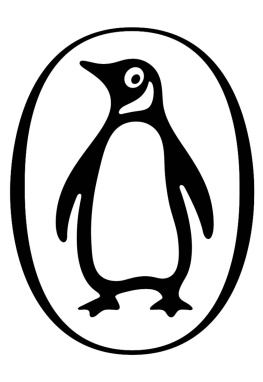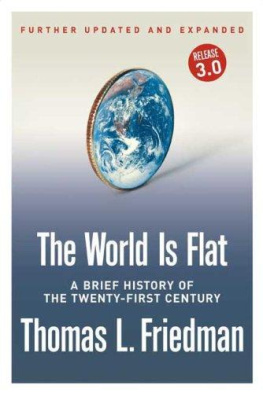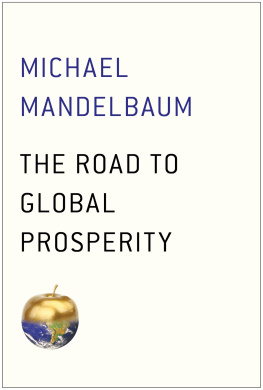
The author and publisher have provided this e-book to you for your personal use only. You may not make this e-book publicly available in any way. Copyright infringement is against the law. If you believe the copy of this e-book you are reading infringes on the authors copyright, please notify the publisher at: us.macmillanusa.com/piracy.
For Ann
Contents
18..
Foreword to the 2000 Edition
Welcome to the paperback edition of The Lexus and the Olive Tree. Readers of the original hardback version of the book will notice that several things have changed in this new version. But what has not changed is the core thesis of this book: that globalization is not simply a trend or a fad but is, rather, an international system. It is the system that has now replaced the old Cold War system, and, like that Cold War system, globalization has its own rules and logic that today directly or indirectly influence the politics, environment, geopolitics and economics of virtually every country in the world.
So what has changed? I have reorganized the early chapters to make my core thesis a little easier for the reader to identify and digest, and I have used the year since the book was originally published in April 1999 to gather more evidence and to update and expand the book with all the technological and market innovations that are enhancing globalization even further. I have also re-examined some of the more controversial subtheses of this book. One is my Golden Arches Theorythat no two countries that both have McDonalds have ever fought a war against each other since they each got their McDonalds. I feel the underlying logic of that theory is stronger than ever, and I have responded to those who have challenged it in the wake of the Kosovo war. Another change is that the chapter originally entitled Buy Taiwan, Hold Italy, Sell France is now broken into two parts. The new chapter, called Shapers, Adapters and Other New Ways of Thinking About Power, builds on a question I raised in the first edition: if economic power in the globalization system was first based on PCs per household in a country, and then on degree of Internet bandwidth per person in a country, what comes next? This chapter tries to answer that question by looking at evolving new ways of measuring economic power in the globalization era. Finally, I have tried to answer some of the most oft-asked questions I got from readers of the first edition: Now that you have described this new system, how do I prepare my kids for it? and Is God in cyberspace?which is another way of saying, Where do moral values fit in?
The new world order is evolving so fast that sometimes I wish this were an electronic book that I could just update every day. My more realistic hope is that when the day comes years from now when this book can no longer reside on the Current Affairs shelf in bookstores, it will find a comfortable home in the History sectionremembered among the books that caught the start, and helped to first define, the new system of globalization that is now upon us.
Thomas L. Friedman
Bethesda, Md.
January 2000
Opening Scene: The World Is Ten Years Old
Its aggravatingwe have nothing to do with Russia or Asia. Were just a little domestic business trying to grow, but were being prevented because of the way those governments run their countries.
Douglas Hanson, CEO of Rocky Mountain Internet, Inc., speaking to The Wall Street Journal after the 1998 market meltdown forced him to postpone a $175 million junk bond issue
On the morning of December 8, 1997, the government of Thailand announced that it was closing 56 of the countrys 58 top finance houses. Almost overnight, these private banks had been bankrupted by the crash of the Thai currency, the baht. The finance houses had borrowed heavily in U.S. dollars and lent those dollars out to Thai businesses for the building of hotels, office blocks, luxury apartments and factories. The finance houses all thought they were safe because the Thai government was committed to keeping the Thai baht at a fixed rate against the dollar. But when the government failed to do so, in the wake of massive global speculation against the bahttriggered by a dawning awareness that the Thai economy was not as strong as previously believedthe Thai currency plummeted by 30 percent. This meant that businesses that had borrowed dollars had to come up with roughly one-third more Thai baht to pay back each $1 of loans. Many businesses couldnt pay the finance houses back, many finance houses couldnt repay their foreign lenders and the whole system went into gridlock, putting 20,000 white-collar employees out of work. The next day, I happened to be driving to an appointment in Bangkok down Asoke Street, Thailands equivalent of Wall Street, where most of the bankrupt finance houses were located. As we slowly passed each one of these fallen firms, my cabdriver pointed them out, pronouncing at each one: Dead! dead! dead! dead! dead!
I did not know it at the timeno one didbut these Thai investment houses were the first dominoes in what would prove to be the first global financial crisis of the new era of globalizationthe era that followed the Cold War. The Thai crisis triggered a general flight of capital out of virtually all the Southeast Asian emerging markets, driving down the value of currencies in South Korea, Malaysia and Indonesia. Both global and local investors started scrutinizing these economies more closely, found them wanting, and either moved their cash out to safer havens or demanded higher interest rates to compensate for the higher risk. It wasnt long before one of the most popular sweatshirts around Bangkok was emblazoned with the words Former Rich.
Within a few months, the Southeast Asian recession began to have an effect on commodity prices around the world. Asia had been an important engine for worldwide economic growthan engine that consumed huge amounts of raw materials. When that engine started to sputter, the prices of gold, copper, aluminum and, most important, crude oil all started to fall. This fall in worldwide commodity prices turned out to be the mechanism for transmitting the Southeast Asian crisis to Russia. Russia at the time was minding its own business, trying, with the help of the IMF, to climb out of its own self-made economic morass onto a stable growth track. The problem with Russia, though, was that too many of its factories couldnt make anything of value. In fact, much of what they made was considered negative value added. That is, a tractor made by a Russian factory was so bad it was actually worth more as scrap metal, or just raw iron ore, than it was as a finished, Russian-made tractor. On top of it all, those Russian factories that were making products that could be sold abroad were paying few, if any, taxes to the government, so the Kremlin was chronically short of cash.
Without much of an economy to rely on for revenues, the Russian government had become heavily dependent on taxes from crude oil and other commodity exports to fund its operating budget. It had also become dependent on foreign borrowers, whose money Russia lured by offering ridiculous rates of interest on various Russian government-issued bonds.
As Russias economy continued to slide in early 1998, the Russians had to raise the interest rate on their ruble bonds from 20 to 50 to 70 percent to keep attracting the foreigners. The hedge funds and foreign banks kept buying them, figuring that even if the Russian government couldnt pay them back, the IMF would step in, bail out Russia and the foreigners would get their money back. Some hedge funds and foreign banks not only continued to put their own money into Russia, but they went out and borrowed even more money, at 5 percent, and then bought Russian T-bills with it that paid 20 or 30 percent. As Grandma would say, Such a deal! But as Grandma would also say, If it sounds too good to be true, it usually is!
Next page
